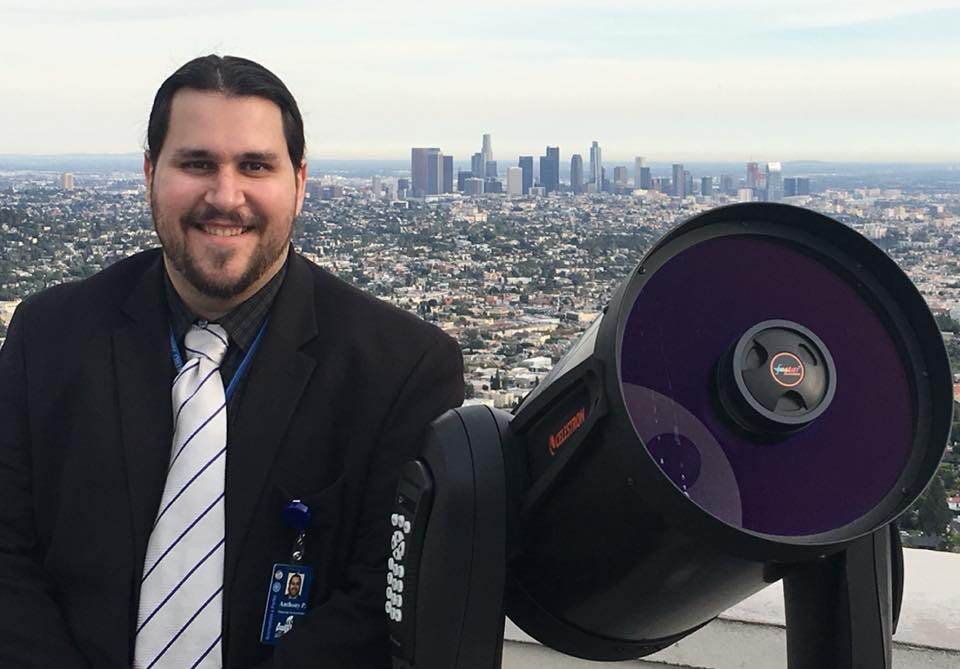
Orion Bear Astronomy is a freelance and outreach astronomy organization based in Riverside, California, serving the Greater Los Angeles area. While the content on O.B.A. is meant to bring awareness to what is in the sky and provide loads of helpful information for that beginner and novice astronomer. I am also available to hire should anyone want me to give a presentation on the sky or provide telescopic views.
I, Anthony Emerson Perkic, have always been considered a science nerd and I have been a passionate amateur astronomer for most of my life. While I had a base knowledge of the heavens when I was young, it wasn’t until 2007, when I was 19, when a combination of inspiration from the sky, college classes, and self taught experiences opened me to the astronomy community! Everything I know is from repeated observations and lots of time spent with telescopes.
While Orion Bear Astronomy was officially established in 2017, the seeds were planted during the decade prior, as I have been hosting and collaborating on outreach events, and have been personally presenting the sky to family, friends, and sometimes complete strangers ever since I got more intense with astronomy.
In 2018, I also began working part time as a telescope demonstrator at Griffith Observatory in Los Angeles, CA, which also began opening new avenues for yours truly, as well as provide another platform to share my passion with the public! If you met me there, I’m glad you’re finally visiting my site!
Also in late 2018, I began diving into the world of astrophotography, which will only give more opportunities to show the best of what the skies have to offer, and my skills have only gotten better with every repeated photography session!
Anything I do with social media, and anything I do in person serves as outreach platforms, as well as directing any interested reader to this website. This website has articles that document experiences, both personal and big events, plus contains many pieces of helpful information that help the beginner get into the world of astronomy.
Here is the link to Frequently Asked Questions
Thank you for visiting Orion Bear Astronomy.
– Anthony Emerson Perkic, Founder and Main Author
Support Your Neighborhood Astronomers!
You know where mainstream media sites get their information? From people like us! Support Your Neighborhood Astronomers! Everything is free, but donations help keep the website alive and go towards outreach events!
$1.00



Saw you on the Toon podcast on YouTube. Amazing looking photos!
I was wondering what is the best response to give the flerfs who seem to think there’s a limit to how far we (and different cameras) can see? The other night Toon was debating and they all were incredulous at his saying “we can see forever”. It seems to be a common misconception among them, but without that belief they can’t explain night and day.
LikeLike
Hi, thank you for visiting!
Toon’s answer is similar to what I say to curious patrons who ask me “how far does the telescope see?” which is: “The distance doesn’t matter so much as long as it can receive the light. If an object is super close by, but not bright enough, then we can’t see it… but if an object is super far away but bright enough, then we can see it.”
The limit is how much LIGHT we can receive in the sky.
Our eyes receive a miniscule amount of light compared to binoculars, cameras, and telescopes. Yet with just our eyes, we can actually spot the Andromeda Galaxy (2.5 million light years away) in the night sky as a faint fuzzy smudge in a dark, non-light polluted sky… simply because that galaxy appears bright enough for our eyes! The Orion Nebula can also be glimpsed as a “fuzzy star” to our naked eyes for that very same reason – it’s bright enough.
Camera lenses, binoculars, and telescopes have more aperture than our eyes and can thus see dimmer objects and resolve smaller details that our eyes could not.
Unfortunately, with many flerfs, no matter how simple of an answer, nor how much proof we can show, because the true sizes and distances in our universe are very vast, it’s just too hard to fathom it.
LikeLike